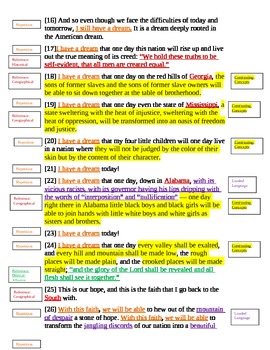

This note was a promise that all men, yes, Black men as well as white men, would be guaranteed the unalienable rights of life, liberty, and the pursuit of happiness. When the architects of our republic wrote the magnificent words of the Constitution and the Declaration of Independence, they were signing a promissory note to which every American was to fall heir. In a sense we've come to our nation's Capital to cash a check. So we have come here today to dramatize a shameful condition. One hundred years later, the Negro is still languished in the corners of American society and finds himself in exile in his own land. One hundred years later, the Negro lives on a lonely island of poverty in the midst of a vast ocean of material prosperity. One hundred years later, the life of the Negro is still sadly crippled by the manacles of segregation and the chains of discrimination.

It came as a joyous daybreak to end the long night of captivity.īut one hundred years later, the Negro still is not free. This momentous decree came as a great beacon light of hope to millions of Negro slaves who had been seared in the flames of withering injustice. I am happy to join with you today in what will go down in history as the greatest demonstration for freedom in the history of our nation.įive score years ago, a great American, in whose symbolic shadow we stand today, signed the Emancipation Proclamation.
#I have a dream speech purpose free#
“And when this happens,” he bellowed in his closing remarks, “and when we allow freedom ring, when we let it ring from every village and every hamlet, from every state and every city, we will be able to speed up that day when all of God’s children, Black men and white men, Jews and Gentiles, Protestants and Catholics, will be able to join hands and sing in the words of the old Negro spiritual: ‘Free at last! Free at last! Thank God Almighty, we are free at last!'” ‘I Have a Dream’ Speech Text Let us not wallow in the valley of despair.” Mahalia Jackson Prompts MLK: 'Tell 'em About the Dream, Martin'Īround the halfway point of the speech, Mahalia Jackson implored him to “Tell ’em about the ‘Dream,’ Martin.” Whether or not King consciously heard, he soon moved away from his prepared text. Pointing out how the country’s founders had signed a “promissory note” that offered great freedom and opportunity, King noted that “Instead of honoring this sacred obligation, America has given the Negro people a bad check, a check which has come back marked ‘insufficient funds.'”Īt times warning of the potential for revolt, King nevertheless maintained a positive, uplifting tone, imploring the audience to “go back to Mississippi, go back to Alabama, go back to South Carolina, go back to Georgia, go back to Louisiana, go back to the slums and ghettos of our northern cities, knowing that somehow this situation can and will be changed. Constitution and other universal themes into his oratory. He began his speech slowly but soon showed his gift for weaving recognizable references to the Bible, the U.S. ‘Free At Last’Īs the March on Washington drew to a close, television cameras beamed Martin Luther King’s image to a national audience. He didn’t even sit down to write the speech until after arriving at his hotel room later that evening, finishing up a draft after midnight. Unlike his fellow speakers in Washington, King didn’t have the text ready for advance distribution by August 27. Martin Luther King, Jr., a young Baptist minister, rose to prominence in the 1950s as a spiritual leader of the burgeoning civil rights movement and president of the Southern Christian Leadership Conference (SLCC). READ MORE: 7 Things You May Not Know About MLK’s ‘I Have a Dream’ Speech Civil Rights Movement Before the Speech The eloquent speech was immediately recognized as a highlight of the successful protest, and has endured as one of the signature moments of the civil rights movement. Weaving in references to the country’s Founding Fathers and the Bible, King used universal themes to depict the struggles of African Americans before closing with an improvised riff on his dreams of equality. before a crowd of some 250,000 people at the 1963 March on Washington, remains one of the most famous speeches in history. The “I Have a Dream” speech, delivered by Martin Luther King, Jr. Mahalia Jackson Prompts MLK: 'Tell 'em About the Dream, Martin'.Civil Rights Movement Before the Speech.


 0 kommentar(er)
0 kommentar(er)
